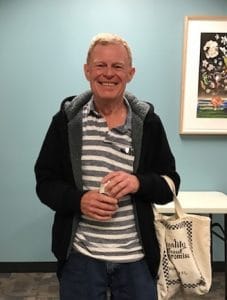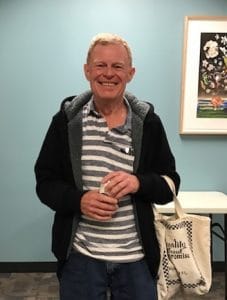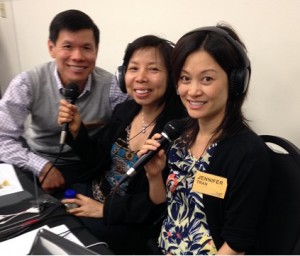Richard Gaule first did the est training in August 1977. At that time, he worked for General Electric in Iowa as a marketing Manager, after having been able to do almost any job in the factory. After the est training it became evident to him that he was living a life that was not his own. He had a wife, 3 kids, 3 cars, a good job and he realized he did not know how he got to this place in his life. He claims he “went a little crazy”, left his wife and kids and – knowing est was founded in San Francisco – moved there in 1978.
He left his wife as responsibly as he could, and gave her everything. He was in a life he could not understand that did not make sense to him. When he went in to see his boss to resign he says his Boss’s mouth just fell open. “You know you are headed towards the Chairman of the Board here” his boss said and Richard replied “Mike, they could give me any job here at General Electric – including Chairman of the Board – and it’s not what I want my life to be About. In fact, I don’t know why my life is about General Electric now!”
Through living and working in the city at various places, he discovered he had a special connection with the “down and out” people who lived there. He felt he had more abilities than most of them had and he championed for them with the bureaucracies they might encounter, such Social Security and disability. He says he managed some of the little tiny hotels where people lived in one room (he says they are still there today) and realized he really had a relationship with them. In fact, its why he created his café.
He realizes now that it was totally irresponsible to have left his previous life the way he did. However, he also says he has gone back and cleaned it all up. He’s paid all back child support, is friends with his ex-wife now, in fact his current wife is also friends with his ex. Although he was really successful in his former life, he says he just could not cope with it.
About 2 years ago he went to a Vietnam Vet reunion, which he had always resisted. He’d spent 7 years in the Air Force. When he graduated from a High School with 161 graduates, he says he was number 161 in the class. The administration said to him “We don’t know what to do with you. You are not stupid, you’re smart, but it takes 26 credits to graduate and you have 8. Normally we’d hold you back a year, but we don’t want to do that with you. We don’t think it will help, we’ve taught you everything we can, and you are a disruption. We are going to give you a special diploma not to come back.”
Richard was baffled. He had no idea he was that bad off. No one had ever told him he had learning issues. In fact, it wasn’t until he was in his 30’s – watching a football game – that he discovered he was dyslexic. A player was talking about it when he realized he had the same issue so he looked it up. He’d thought he was just a normal kid going through normal kid stuff, but remembers when he got out of high school he could not say his alphabet! He could not multiply 3×6 or 7×99 and says he still can’t do 7×9.
He did go to his 50th high school reunion at the insistence of his wife and says it was wonderful. He had conversations with all his old friends – they were the juvenile delinquents. He wasn’t successful in school so he’d run around with the other kids who were his peers. He never hung around with kids who were in an older class, and most of his friends were either Mexican or black. Most of the town he came from did not relate to those from “south of Avenue L”. He was from the wrong side of the tracks. But talking to his friends, he told them “You guys may not know this, but I couldn’t say my alphabet when we graduated”.
None of them had known that. He was smart in a way where he could hide and bury all his own issues. He had a genius for being able to manipulate the system. He had a genius for doing workarounds. His Mom and Dad never knew he couldn’t read! Back then to now he had a movement disorder also and he was a genius at making it disappear so no one would see it. He claims if he didn’t want anyone to know, that no one would ever have suspected he was autistic. He claims to be so stubborn he can manage every twitch he has, but he paid a great cost for it. He says the constant covering up of what was wrong with him cost him all his aliveness.
He discovered he was autistic while doing the Happiness seminar. The Homework was to bring peace to every aspect of his life. In the session he was told to write down aspects of his life where you are not completely satisfied. He wrote down family and money. While doing the homework he discovered he was absolutely complete with every member of his family, so he scratched that area off his list. He then looked at Money and realized he is in a position where he is completely happy there too! He did not have to have more, so he scratched that off as well.
He knew there must be places where he was not completely satisfied with life – and it was then his arm jerked a bit. He paused and said to himself “wait. What is that. It might be important!” So he just relaxed and his body exploded! His arms were flailing and wailing about. He had known he had little jerks but had spent a lifetime covering it up so no one would know. Over the next few days he experimented with just letting it go and not suppressing it. He was sitting at a stop sign with his arms flailing when he looked over to see a Highway Patrolman. He thought to himself “He probably thinks I’m listening to the radio or something – I’ve seen people that look like that”, and he just laughed.
He went to Kaiser to see what was really going on and said to the doctor “This might be weird but this is the best thing that’s ever happened to me because when I allowed the jerking of my body I was more available to see what was going on around me instead of being consumed for years with making it stop.” I became more present in my life. I was using about half of my mental capacity just controlling the jerks. It took a lot of effort to stop his foot or arms from shaking. I stood up at the seminar and told them this was extraordinary!”
He discovered he’d never really been present anywhere in his life because he had to constantly manage all this. He decided to take a road trip in his car and visit 37 people in 36 states, traveling over 9,000 miles. He went to see everyone who had been influential in his life from childhood to the present. He wanted to talk to them to discover who they really were and who he was for them. He realized he had never really been present when he’d known them.
He’d been to the wedding of some friends in the late 1960’s in Tennessee. He had a heck of a time finding them – and hadn’t told anyone he was coming. He hadn’t seen these people since before 1970. He knocked on the door but no one answered. After a few minutes he saw the blinds part just a little and a little old woman looked out and said “Can I help you?”
“Are you Mary? He asked?”
“Yes” she said and he proceeded that he’d known her when she had her maiden name. He said she just looked at him for a minute then said “Who in the hell can you be?”
“I’m Dick Gaule and I was at your wedding” He said and she opened the door. They had a great talk and she said he looked just the same.
It was during this trip he went to the Vietnam reunion. Richard says when he returned home from Vietnam he never followed the war. He didn’t even know when it had ended. It was his wife who talked him into going, reminding him he had loved his High School reunion.
Before leaving on the trip he had made a list of those he wanted to visit, and so far had seen about half of them. He got to the Vietnam reunion a night or two early and camped out on the gulf coast beach. The day of the reunion he was at the hotel when all of his old friends started to show up. He hadn’t seen them since 1967. No letters, no phone calls, nothing. What was amazing was he hadn’t realized how well he had known these guys – it was like his high school reunion. One guy showed up in a wheelchair and just stared at the floor. Richard looked at him and said “Gosh Tom, it’s good to be with you after all these years”. The man looked him straight in the face and screamed “Do you still have nightmares?”
Richard started to collapse. He grabbed on to Toms wheelchair and thought “My god I’m going to fall down right here!” All he could do was look at the door and his mind was screaming “Get out of here! Run!” He wanted nothing more than to go out to his car and go home.
After a few minutes several of the others came back and they all went into the lounge. He still wanted to leave and his mind was in confusion. It was overwhelming for him. Although he wanted to leave, his legs just would not move.
Pretty soon he became aware there was a conversation going on around him about the war when another soldier had taken on mortar fire. They had all thought he was dead. Turned out after a few days in the hospital he was fine. Back then for weeks after the incident, whenever the soldier would walk into a room everyone would yell ‘BOOM’ and fall back on the bed. Here at the reunion they were making jokes about it. They were reenacting this thing from the war and he sat there thinking “these people all have issues”. He was the person in charge of these guys in the war and at the time he says he didn’t have the ability to be a leader. He says he got “stuck” in the position much like Forest Gump. If the military told him to do this or that he just did. He was the perfect military guy that way. Sitting at the reunion he thought “If I’d had the tools I have today back in those days, Tom might have had a better life.
He credits est and Landmark with giving him the ability to go back to a point in the past and pull it apart to see “what did you make it mean”. He realized if he could get a conversation going with these guys where they could get complete with those issues – if he could start the conversation today, maybe he could make a difference with them. The next week was spent “pulling apart” the nightmares, recreating their stories, bringing his Landmark tools, and sorting things out in the mens’ memories, Tom (in the wheelchair) most of all. For hours, they would sit in the hotel crying and getting things out with people passing by. What he was creating was a healing.
At the end of the week there was a going away breakfast and Tom in the wheelchair asked him to sit next to him. When the waitress came he said loudly “Let’s pray”. As he talked, he spoke about his Vietnam experience in the tiniest details. He said “I didn’t do anything wrong, but I was the one who told the planes exactly where to drop the bombs and 27 of our people died. We napalmed our own guys and I’ve never been able to live with that.”
Richard saw him looking around the table making eye contact with each of the men where previously he’d only looked at the floor. He then looked at Richard and said “I’ve been to the Vietnam War memorial wall 3 times but I’ve never been able to get near the place where the 27 men are listed. I think I can go back now and it’ll be okay. Thank you”. Everyone had tears in their eyes. Richard had set him free. To Richard it was a miracle that was in his ability to bring the tools he’d learned to make a difference for them.
A week later he was visiting his ex-wife and 2 adult kids in Texas (they were on the list). He told his Wife what had happened at the reunion and mentioned each of the men had come back with PTSD. He asked her if she had noticed anything different about him when he came back. His daughter yelled “Are you Frgthjking kidding me?”
His ex-wife said he was nice enough person but he’d come home from work each day, eat dinner, watch tv, go to bed and do it again the next day. She said the only difference between weekdays and weekends was he did not go to work on weekends. All he did was watch TV. He’d do whatever she wanted from him and act nice enough, but the baby could walk around with dirty diapers for days and he wouldn’t have noticed. She said she knew she was dealing with something bad, but she did not know how to handle it. He had never even realized it. He told her he remembered being in love with her and life before the war. He said if he hadn’t gone to Vietnam, they might still be married today having a great life with kids and grandkids. He apologized to her saying he could see ow something had changed in him and that he was a different person that came back.
His trip took him to several other old friends and when he came back and thought about the conversations, he remembered the plane ride coming home from war. They had sent him home a month early and he had no idea why. He was supposed to go from Vietnam to Hawaii and was diverted (due to weather) to Anchorage. It was 3 degrees below zero and all of the troops were in short sleeved uniforms. He remembers going into the airport, leaning against the wall and collapsing. He was cold and shaking. He spent one more year in the air force in Kansas, but discovered when he finally was discharged, his mind switched around some of the events he’d witnessed and dates. He realized when he’d gotten to Anchorage, he was so relieved he and his men had made it out alive, he had a mental breakdown. He realized his lack of doing anything but watching TV was part of his escape.
It was only since the reunion that his life started to become clear. He was watching a film about Temple Grandin about autism and her struggles and triumphs and he realized he thinks like Temple thinks. He said he doesn’t think like normal people. If someone said, “Think of blue” he didn’t think of a color, he’d think of oceans and sky and pictures. That’s why he couldn’t get through High School. He couldn’t read something and have it make sense to him.
When he saw something on TV or in person, he could. He was doomed to fail in high school, but no one ever mentioned the word Autism. He said in his day you were either retarded or normal, and his family was not going to let him be retarded. He had to pretend he was normal. His worst times were when he had to sit somewhere and “be normal” (not twitch).
For example, he loved Sunday School but when it came time to sit next to Grandma in church, fear of being found out paralyzed him. Also, Grandma would make him practice the piano every night. He’d come home from school and for the next 15 or 20 minutes he had to practice. After 7 or 8 years of piano lessons he still could not play with both hands. His younger brother played beautifully – and it made him feel horrible because he could not master it.
He says today people tell kids with autism they have an issue so they can adapt, but no one did for him. In hindsight, he said, it took him 70 years to figure it out. All his life it was his worst fear (having Autism) but now it has become his greatest attribute. He resisted it and the movement disorder, but no more. Without resistance he is freer to be present to what’s happening around him. As long as he is not trying to hide and control his autism, I’m actually more present in his life. He says he now has the ability to say how his life will go. Happy or sad, he is no longer the victim of something he doesn’t understand. He is free.
He says “Being Autistic doesn’t have to be something that means something about him”. He had it that not being able to read meant something about him. It was only his talent for hiding, to pretend and to fool people that gotten him high in the ranks of GE. It was all manipulation.
Richard says it was his limitations that had him have to figure out how to do things and he’s done some incredible things. He’s made a huge contribution to the homeless community.
While living in the tenderloin district of San Francisco, he opened a café called “SOUPS”. He had created a 10 year plan for the business but he says its due to his autism that he ended up staying for 11 years. He couldn’t figure out how to get out of it. He also cannot ever be late. He says that’s autism too. He says he now can say he honors his word at Landmark, but it’s something that’s always been with him.
After competing the est training in 1977, he did did many seminars and advanced classes but it want until he reviewed the Landmark Forum in 2015 for the sixth or seventh time that he could get up in front of the room and speak. He’s hoping someday to hear of a Landmark Forum for Autistic People.
He said the programs have given him the ability to look at his autism. After all the seminars and all the training, he says if he had never done est and stayed at General Electric he would have had a great life, but he would have missed something. It’s in discovering his own self-satisfaction that he’s been able to make a huge difference on the planet. He says when he walks through the Tenderloin District today it isn’t long before someone asks him when he’s coming back to reopen his café, but more importantly he says there are people alive today who would not have been if he hadn’t been there. He says that makes life worth living.
To read more about Richard’s life and the café, check out this profile of him from the San Francisco Chronicle.





2 comments
I am grateful for this writing. I am a Landmark grad. I too, have had a vision for Landmark for Autistics, having used LE in my being with Autistics. I am an Advocate. I work with a company called Advocates, Inc. in Upstate NY. Because of this writing I will contact Richard. Thank you for writing this,
Mindy Sullivan.
It was all my pleasure. Richard lives close enough to me so I got to meet this wonderful man. We kept on talking long after the interview!
-Mindy Sullivan